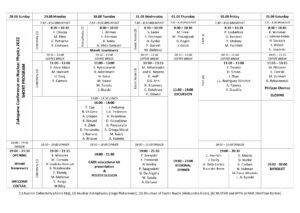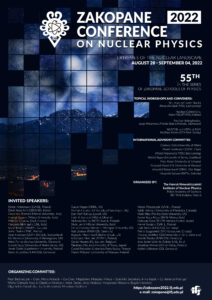Program

Invited lectures, selected seminar contributions and posters will cover advances in the study of nuclear phenomena: from low lying shell model states to collective excitations at extreme spins and temperatures, from light to superheavy nuclei, from exotic proton drip-line nuclei to very neutron rich nuclear systems and neutron-stars. Latest ideas and advances in nuclear theory will be presented as well as new experimental results. New methods and apparatus developed and used at stable and radioactive ion beam facilities will be reviewed. We will discuss the impact of nuclear physics on other areas, such as astrophysics, healthcare, energy production or security.
The scientific program of the Conference will consist in part of a series of one-day topical workshops focused on experimental and theoretical aspects of:
- the structure of exotic nuclei situated at the borders of the nuclear chart,
- the collective phenomena in nuclei over a wide range of of temperatures and spins,
- the nuclear physics processes in supernovae explosions and in neutron-star mergers.
- There will be also a special workshop on the construction of FAIR and the development of nuclear physics research and its applications within the FAIR collaborations: NUSTAR and APPA .
They will be convened by world class experts in these fields.
Most of the Conference time will be devoted to reports on the latest achievements in the nuclear research. These contributions will be chosen with a help of the International Advisory Committee bringing together outstanding scientists, representing the world wide nuclear physics community.
Each session will include a few invited talks (duration of 20 to 30 minutes) and selected contributed seminars (duration of 15 minutes).
Conveners of the topical workshops:
Alexandra Gade (MSU, East Lansing) – Structure of Exotic Nuclei,
Adam Maj (IFJ PAN, Kraków) – Nuclear Collectivity,
Jorge Piekarewicz (Florida State University, Tallahassee) – Nuclear Astrophysics.
Wolfram Korten (CEA Paris-Saclay) – NUSTAR and APPA at FAIR.
International Advisory Committee:
Gianluca Colo (University of Milan)
Marek Lewitowicz (GANIL, Caen)
Witold Nazarewicz (MSU, East Lansing)
Patrick Regan (University of Surrey, Guildford)
Peter Reiter (University of Cologne)
Krzysztof Rusek (HIL University of Warsaw)
Krzysztof Rykaczewski (ORNL, Oak Ridge)
Hiroyoshi Sakurai (RIKEN, Saitama)
Invited speakers (preliminary list):
| Dieter Ackermann (GANIL, France) Deuk Soon Ahn (CENS IBS, Korea) Giovanna Benzoni (Milano University, Italy) Franco Camera (Milano University, Italy) Giacomo de Angelis (LNL, Italy) Iris Dillmann (TRIUMF, Canada) Jerzy Dudek (IPHC, France) Sean Freeman (CERN-ISOLDE, Switzerland) Martin Freer (University of Birmingham, UK) Hans Fynbo (Aarhus University, Denmark) Umesh Garg (University of Notre Dame, US) Jacek Golak (Jagiellonian University, Poland) Paolo Giubellino (FAIR/GSI, Germany) Gaute Hagen (ORNL, US) Muhsin Harakeh (University of Groningen, Netherlands) Dan Hoff (Umass Lowell, US) Fedir A. Ivanyuk (NAS of Ukraine) Nicholas Keeley (NCBJ Świerk, Poland) Philppe Landry (University of Chicago, US) Silvia Leoni (Milano University, Italy) Elena Litvinova (Western Michigan University, US) |
Yuri Litvinov (FAIR/GSI, Germany) Augusto Macchiavelli (Berkeley Lab, US) Katarzyna Mazurek (IFJ PAN, Poland) Gerda Neyens (KU Leuven, Belgium) Takaharu Otsuka (University of Tokyo, Japan) Costel Petrache (IPN Orsay, France) Marek Pfutzner (University of Warsaw, Poland) Marek Płoszajczak (GANIL, France) Sakib Rahman (University of Manitoba, Canada) Mark Riley (Florida State University, US) Xavier Roca-Maza (INFN Milano, Italy) Hideyuki Sakai (RIKEN Nishina Center, Japan) Hervé Savajols (GANIL, France) Haik Simon (FAIR/GSI, Germany) Pietro Spagnoletti (SFU Vancouver, Canada) Thomas Stöhlker (GSI/University of Jena, Germany) Yoshiki Tanaka (FAIR/GSI, Germany) Jose Javier Valiente Dobon (LNL, Italy) Jonathan Wilson (IPN Orsay, France) Kathrin Wimmer (GSI, Germany) |
Special lectures
- The conference program will start with a keynote talk by Witold Nazarewicz (MSU, US) who will summarize the status and perspectives in the field of low-energy nuclear physics.
- During the conference, Marek Lewitowicz (NuPECC/GANIL, Fr) will present the forthcoming NuPECC Long Range Plan 2024 for Nuclear Physics in Europe ( http://nupecc.org/?display=lrp2024/main )
- The closing lecture will be given by Philippe Chomaz (CEA, Fr) who will introduce Qantum Computing- one of hot topics in science.
Poster Session
Posters (B1 format, portrait orientation) will be divided into 3 categories: E-experiment, I-Instrumentation, T-theory. At the dedicated Poster Session authors are expected to present and discuss their work. Best papers can be published in the conference proceedings. Winners of the poster competition will be awarded a special cash prize founded by NuPECC. To create a friendly and informal atmosphere during the Poster Session, we will serve snacks and refreshments.
During the Poster Session CAEN will present advanced tools for educational labs. CAEN brings the experience acquired in almost 40 years of collaboration with the High Energy & Nuclear Physics community into the University educational laboratories by providing modern physics experiments based on the latest technologies and instrumentation.
CAEN Educational Kits, mainly based on Silicon Photomultipliers (SiPM) are provided with a dedicated Control Software, are modern and flexible platforms for teaching the fundamentals of Statistics, Particles Detection and Nuclear Imaging. CAEN developed a series of experiments with different difficulty levels which can be performed at the high school level, undergraduate physics laboratory and Ph.D. courses. Some of these experiments will be carried out at the exhibition.


